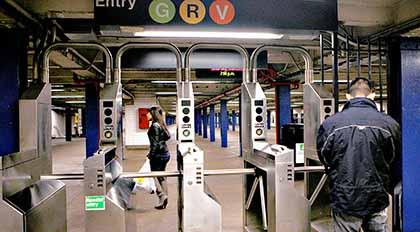By Philip Newman
The MTA board was to vote in a special meeting this Thursday on whether to approve increases in bus and subway fares, including the price of unlimited MetroCards. The base $2.25 fare was to remain unchanged for single tickets paid by cash and MetroCards.
But there was a host of hikes proposed by the board, which would boost the cost of a single ride to $2.50 and reduce the bonus on Pay-Per-Ride MetroCards to 7 percent from 15 percent.
If passed as expected, these would mark the third fare hikes since 2008.
Transit officials had discussed putting a limited number of rides on unlimited MetroCards, but sentiment from straphangers was overwhelmingly in favor of leaving them uncapped.
But the unlimited monthly MetroCard is expected to rise from $89 to $104. The weekly unlimited MetroCard would go from $27 to$29.
The transit fare hikes, if approved, would go into effect in January.
“I think New Yorkers said they really like having an uncapped, unlimited monthly pass to go around the city,” said Metropolitan Transportation Authority Chairman Jay Walder.
Walder was referring to the many people from across the city who showed up at a series of public hearings last month to vigorously protest the idea of limited rides on weekly and monthly MetroCards.
The fare increases are part of an MTA plan to hike the cost of mass transit and tolls every two years.
Among other changes that are likely to be passed by the MTA’s board of directors are free transfers between the Long Island Rail Road in Flushing and the MTA bus routes Q19, Q25, Q34, Q50, Q65 and Q66.
The express bus fare would hold steady at $5.50.
On the LIRR, fares would go up in a range between 6.4 percent and 11.5 percent for one-way trips, ten trips, monthly tickets and weekly commutation.
The MTA is struggling with an $800 million budget gap with interest from borrowing $23 billion looming in the next year.
Against this backdrop the agency eliminated two subway lines, the M to Middle Village and the W to Astoria, earlier this year and cut 34 bus routes around the city
The transit agency borrowed the money after the administration of Gov. George Pataki cut off state funding and New York City reduced its contributions for the MTA Capital Fund, which pays for large projects like the Second Avenue subway and the East Side Access to bring the LIRR into Grand Central Terminal. Money provided by the federal government for the big projects may not be used for operating expenses.
A payroll tax in the 12 counties served by the MTA intended to provide transit funding has failed to provide expected tax receipts to help relieve the agency’s money problems.
The MTA is also suffering from a sharp drop in taxes from real estate transactions, from which it long derived millions of dollars.
As result, the MTA has embarked on a vigorous program of consolidation, layoffs and crackdown on overtime pay in an effort to save money.
Reach contributing writer Philip Newman by e-mail at timesledgernews@cnglocal.com or phone at 718-260-4536.



































